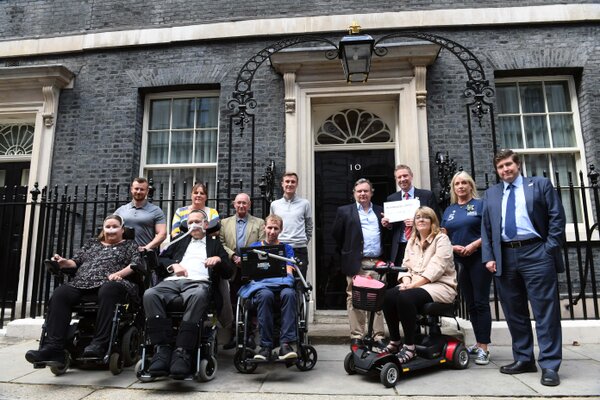After weeks of tough talks with MPs and civil servants, neurologists now have a way of applying for £50million of funding which they are positive will allow them to focus on finding effective treatments for the rapidly progressing terminal condition.
However the United To End MND coalition was dismayed when told earlier this year by civil servants that scientists would have to make between 100 and 300 applications for the £50million, which would have delayed research by decades, as each application takes weeks or months to process.
The team had been hoping that the funding could have been accessed through a single application, which was not acceptable to the Government.
Leading neurologists Prof- essor Ammar Al-Chalabi, from King's College London, and Professor Chris McDermott, from Sheffield University, have been in talks since then to find a way to allow scientists to focus on research instead of on filling out hundreds of forms.
A compromise has now been reached for which they thanked Dr Jo Latimer, head of neuroscience and mental health at the Medical Research Council and Dr Claire Kidgell, assistant director of the National Institute for Health and Care Research.
Care Minister Gillian Keegan, and MPs Andrew Lewer and Stephen Baker have also been instrumental in finding a way to reduce the red tape.
Professor Al-Chalabi, director of the MND Care and Research Centre at King's College London, said: "It is not our preferred method but it is a compromise we can work with.
"So it won't be a single application for the whole pot but it will probably be about three or four applications a year which we can help co-ordinate across the MND scientific community nationally.
"For 300 applications we would have had to make two or three applications every week to get the £50million within the five years, which was ridiculous.
"This is the best way forward and we are optimistic."
The leading neurologist said that work can now start on three applications for about £6million of the £50million to use in the first year.
These will be for the best way to store huge amounts of data that is accessible to five universities and 22 research centres, a model for testing new drugs nationally and an infrastructure for clinical trials to take place at regional centres instead of just a few specialist research centres.
Prof Al-Chalabi said: "I would expect it to be about a year before we receive the first of the £50million funding.
"That is why it was frustrating to have this six-month delay in agreeing how we get the funding.
"At some point you have to stop talking about how you are going to get the money and just get on with it."
He added: "This will help us move towards finding a cure for MND within years, rather than decades."
And international colleagues, including those based in the Netherlands and Spain, have expressed an interest in the campaign run by the coalition and this newspaper as a model they can adopt to get funding for research.
Lee Millard, who is living with MND and came up with the idea of the campaign with another patient, David Setters, said: "There has been flexibility shown by the Government.
"The processes that would have been prohibitively restrictive for the £50million MND mission are now being streamlined with the new partnership and with the help of Government departments.
"Our researchers are increasingly confident that this new model will enable the funds to be released efficiently."
Former rugby union star Doddie Weir, who is also living with MND, said: "I'm happy we're finally making progress with accessing the promised money but it's frustrating that it has taken this long.
"I think the Prime Minister and Health Secretary are genuinely keen to fulfil their promises but red tape seems to slow everything down.
"People with MND don't have time on their side, so we must keep pushing and working together if MND is ever going to be beaten.

